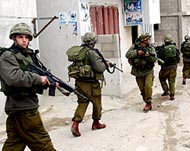Palestinian fights for honour in US
Abd al-Haleem Ashqar knows what it is like to be hungry. He understands the exhaustion, both mental and physical, that comes from depriving oneself of food for long periods of time.

In early November, Ashqar, a long-time Palestinian activist, ended a two-month hunger strike in jail.
He was incarcerated for refusing to testify before a federal grand jury in Chicago investigating alleged money-laundering activities in the United States by the Islamic resistance group Hamas.
Although federal authorities are not charging him with any “terrorist-related” crime, they say his unwillingness to answer questions about the case constitutes a criminal contempt of court.
If convicted, he faces a lengthy prison sentence and a maximum fine of $250,000.
At his home in Alexandria, Virginia, Ashqar is recuperating from the damage done to his body during the eight weeks he went without food while in federal custody.
His energy level has improved, but because he is under house arrest, exercise is difficult.
Crime of defiance
Ashqar said he is innocent of any criminal activity and has never had any formal involvement with Hamas of any kind.
His only crime, he said, was defying the US government when asked to testify against his friends and fellow activists.
He described his stint in jail as a form of torture “because of my race, because of my nationality, because of my cause and, somehow, because of my religion”.
The hunger strike was a small price to pay for a larger principle, he added.
“The most valuable thing in my life is my honour and that was jeopardised, so I didn’t care about anything else,” he said.
|
|
|
An armed member of the |
His attorney, Stanley Cohen, called the case part of the government’s attempt “to punish a man who has now stood up to the government, not once, but twice”.
“Part of this is a power trip for them, the fact that he walked away five years ago irked them,” Cohen said, referring to a similar instance in 1998 when Ashqar refused to testify before a federal grand jury in New York.
Matthew Levitt, a senior fellow at the Washington Institute for Near East Affairs and a former analyst for the FBI’s “counter-terrorism” operations, said Ashqar’s connections to Hamas are backed up by FBI surveillance information and that they involve “much, much more than political activities”.
But Dr Laura Drake, editor of the Middle East Affairs Journal and Ashqar’s supporter, said his prosecution is part of a government effort to crack down on Palestinian activism in the United States.
“They want to stop people from supporting the Palestinian people,” she said.
Indictment
A spokesman for the US Attorney’s office in Chicago declined to comment why Ashqar was called before the grand jury.
The indictment against him is that he refused to answer a series of questions “about Hamas and members of Hamas, as well as questions regarding defendant Ashqar’s personal and professional background.”
Ashqar’s trouble with US authorities goes back to 1993, when he said the FBI first contacted his academic adviser at the University of Mississippi, where he was studying for his PhD in management information systems.
|
|
|
Ashqar has criticised Israel’s |
Court documents in a 2002 case involving the Holy Land Foundation for Relief and Development, a US Islamic charity shut down by the government, claim Ashqar set up a meeting of Hamas activists in Philadelphia in 1993 and again in Oxford, Mississippi in 1994.
He denied organising the meetings and said the one in Philadelphia merely involved representatives from different US organisations.
That same year he co-founded a non-profit organisation called al-Aqsa Education Fund, to support various education projects in the West Bank and Gaza Strip, but which federal authorities suspected to be a conduit for channelling money to Hamas.
Ashqar said the Israeli government was mostly to blame for his legal problems in the US. “The FBI started an investigation per the request of Israel,” he said.
Ashqar, who was born in the West Bank’s Seida, a small village northeast of Tulkarm, angered Israeli security officials during the mid-1980s as director of the public relations department at the Islamic University of Gaza (IUG).
In that position, he wrote articles for the school magazine criticising Israel’s occupation policies.
He then came to the US in 1989 to pursue his doctorate.
While at the University of Mississippi, officials at the Islamic University of Gaza instructed him to coordinate financial transactions between the school and various sources in the Arab world, he said.
Questions raised
Acting as that third party would eventually get him in trouble with the FBI, which began following his every move.
In the early 1990s, Ashqar became involved with Dr Musa Abu Marzuk, a member of the board of supervisors at IUG and the president of Hamas’s political wing.
Marzuk was living in the US and Ashqar said IUG officials asked him to work with him on money and communications issues involving the university.
“I was directed by the president, the acting president of the Islamic University of Gaza to contact and maintain a relationship with him regarding the university and that’s what I did,” he said.
|
“The most valuable thing in my life is my honour and that was jeopardised, so I didn’t care about anything else” Abd al-Haleem Ashqar |
But he strongly denied ever having a direct relationship with Hamas, saying he had “no affiliation, neither formal nor informal” with the organisation.
Regardless of the nature of his association with Marzuk, Cohen said all of their dealings occurred before 1995, the year the US designated Hamas as a “terrorist” organisation.
In late 1997, a federal grand jury in New York looking to indict suspected Hamas activists served Ashqar a subpoena, ordering him to testify.
Civil contempt
When he refused, the court held him in civil contempt and sent him to jail on 23 February 1998. On the first day, he began a hunger strike that lasted four months until the judge ordered his release.
Things slowed down a bit, until this year when he was told he would be asked to testify before another grand jury in Chicago. The request stemmed from Ashqar’s political asylum case, which he applied for in December 1998.
 |
|
US authorities have jailed |
The court informed him during a preliminary hearing in April that he would either have to testify before the grand jury or before an immigration court, so he withdrew his request for asylum, saying he had had enough of the American justice system.
After again declining to answer questions, Ashqar was sent back to jail on 5 September, where he began his second hunger strike.
On 14 September, officials transferred him to a hospital, shackled him to a bed and inserted an IV to feed him intravenous fluids, an experience he described as humiliating and dehumanising.
Finally, a judge freed him on 3 November, after eight supporters agreed to put up their homes totalling $874,500 as bail.
His trial is scheduled for June 2004.

